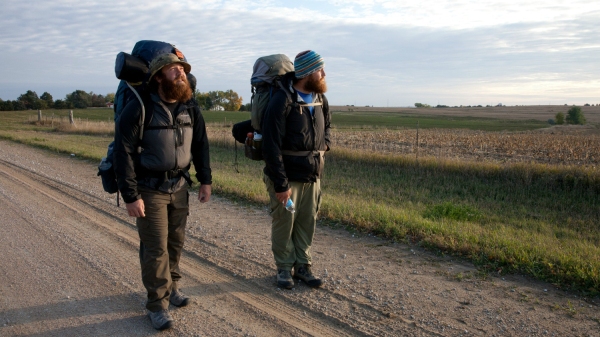Len wouldn’t watch his own movie. Len is a spiky, angry former punk rocker turned hit pop producer, stewing in his infinity pool and his own self-loathing at his “country estate.” He listens to audiobooks of Western novels and watches old police shows on television. I doubt that he would watch Tim Godsall’s “Len & Company,” the fuzzy and unfocused indie drama that stars Len, out on DVD this month from IFC Films and available on Netflix.
Monthly Archives: October 2016
Instant Gratification: “Sicario” and four other good movies to watch on Netflix and Amazon Prime
Pick of the Week: “Sicario“ (Amazon Prime) — This stomach-churning action-thriller offers a neat bit of misdirection, as a rising star FBI agent (Emily Blunt) is brought into a mysterious task force fighting Mexican drug cartels, led by a flip-flop wearing government agent (Josh Brolin) and his mysterious advisor (Benicio Del Toro). She doesn’t know who she can trust, and neither do we, as her attempts to bring moral clarity to the fight are swamped in a world of corruption and violence on all sides.
Gone in an Instant: “E.T. The Extra Terrestrial” and four other good movies leaving Netflix in November
It’s not your imagination — there’s less to watch on Netflix than ever before. A new report claims that the online streaming service has cut its streaming library in half since 2012, from 11,000 titles to around 5,500.
“Little Sister”: A nun on the run comes home to her Goth roots
“Little Sister” screens at 7 p.m. Wednesday at the Madison Museum of Contemporary Art, 227 State St. Tickets are free for museum members, $7 for all others. Not rated, 1:31, three stars out of four.
It’s a little disconcerting to see a film that’s a period piece set only eight years ago, sparking a feeling of “Didn’t that just happen?” Zach Clark’s “Little Sister” is set in the fall of 2008, and the cultural signifiers are everywhere – candidate Obama’s speeches on television, talk of Iraq. There’s even a scene featuring a performance art piece with a dancing Twin Towers.
But Clark’s film uses the moment as a backdrop for a funny, wistful little comedy-drama about family members learning to overcome themselves and reconnect with each other. Can we reconcile with those who know us only too well? Yes, we can.
Instant Gratification: “The Witness” and four other good movies to watch on Netflix
Pick of the Week: “The Witness“: My full review is here. The best documentary I’ve seen this year is this haunting and healing film about the notorious Kitty Genovese murder, in which a woman was reportedly killed on the streets of New York in 1964, her screams heard but unanswered by her neighbors. Decades later, Genovese’s brother Bill goes searching for the real answers, and finds that the original reports got a lot wrong. By grappling with the truth of her death, Bill is finally able to reclaim her life — the scene of him watching as an actress recreates the moments of his sister’s death on the exact spot where it happened is one of the most powerful things I’ve seen in a movie theater this year.
How two gangly Minnesota boys made a Texas noir called “Blood Simple”
Emmet Walsh didn’t know much about these two gangly brothers from Minnesota who wanted to make a Texas noir. And he thought he was too young to play the part of Loren, the killer in the canary-yellow suit with the cheerful laugh.
“Kaili Blues”: Dream a little dream in a fast-changing China
“Kaili Blues” has its Madison premiere at 7 p.m. Wednesday at the Madison Museum of Contemporary Art, 227 State St. FREE for museum members, $7 for all others. Not rated, 1:49, three stars out of four.
“Man, have you ever had one of those dreams that are completely real?” That’s a line from Richard Linklater in his 1991 debut film “Slacker,” a movie I kept thinking of as I was watching Bi Gan’s “Kaili Blues.” Both films are from first-time filmmakers, daring but a little shaky in execution, promising great things in the future. And both eschew traditional narrative structure for an elliptical, dream-like story.
Instant Gratification: “Zootopia” and four other good movies to watch on Netflix
Pick of the week: “Zootopia” (Netflix) — My full review is here. This candy-coated Disney animated film doesn’t sugarcoat the complexities of race relations, as a bunny rookie cop (Ginnifer Goodwin) comes to the big city and learn that all the animals there don’t live in quite the harmonious mosaic that she thought. It’s relentlessly clever, funny and resonant — when a villain who has been pitting one group of animals against another exclaims “Fear always works!,” one can’t help but think of a certain 2016 presidential campaign or two. (Okay, just one.)
Milwaukee Film Festival: “Almost Sunrise,” “Cameraperson” and “The Legend of Swee’ Pea”
I only got out to the Milwaukee Film Festival for one day this year, binging on three documentaries in a row at the beautiful Oriental Theatre. But I left satisfied — all three documentaries were strong, each taking fundamentally different approaches and having fundamentally different goals. The festival continues through Thursday.
First up was “Almost Sunrise,” an express “advocacy documentary” meant to raise awareness, with the film being on the vanguard of an overt campaign to raise awareness and get action on a specific issue. In this case, the “issue” was the mental anguish that many Iraq and Afghanistan war veterans feel upon returning to the United States. Most have heard of post-traumatic stress syndrome, but a lesser-known but more prevalent problem is “moral injury,” a broad term used to describe the guilt and shame many veterans feel over what they had to do while they were in-country.
Michael Collins’ “Almost Sunrise” follows two Iraq veterans, Tom Voss and Anthony Anderson, both suffering from moral injury, leading to substance abuse, alienation from loved ones, even suicidal thoughts. In an attempt to deal with their damaged psyches, as well as raise awareness about veterans’ mental health issues, the pair embark on a five-month walk from their native Milwaukee to California.
In many ways, the 2,700-mile walk is an easier one to take than the long road back from emotional trauma. As the men walk, and talk with veterans and others who walk with them, you can see them start to unclench, open up a little to the world around them. But it’s not easy; while Anderson emerges from the journey reinvigorated and ready for change, Voss is still struggling, and only finds his breakthrough months later at a mindfulness and meditation retreat.
It’s a beautiful, empathetic film, prompting plenty of tears both on screen and in the audience at the Oriental. While the focus of headlines and cable news has moved away from Iraq and Afghanistan, “Almost Sunrise” serves as a reminder of what the veterans of those wars are still grappling with. The film provides a valuable chance to walk in the shoes of men we might not otherwise get to know.
Kristen Johnson’s “Cameraperson” is a daringly different documentary in terms of form, but provides much the same service of helping us see and understand others. Johnson is a veteran cinematographer who has traveled the world shooting documentaries, and she presents “Cameraperson” as a “memoir,” “the images that have marked me” she writes in a brief onscreen introduction.
At first, the film seems like a scrapbook of footage Johnson has shot over the years. The location is often provided, but nothing else, not even the year the footage was shot. A farmer in Bosnia. An amateur boxer in Brooklyn. A CIA “black site” in Yemen. Johnston’s own mother, who has Alzheimer’s. A hospital in Liberia, where a harried doctor has delivered one baby and trying calmly to save the oxygen-deprived twin. Johnston’s own baby twins.
Writing them out in a list like that, one can start to see where the images will connect and rhyme with one another. But watching “Cameraperson” is another experience entirely, as what seems like a random assemblage crystallizes into a finely-constructed mosaic of the human condition. Beauty and ugliness, kindness and cruelty, anger and peace, it all exists side by side, and sometimes inside each other. Returning to Bosnia years later after making a documentary about mass rapes committed there, Johnson confesses to the family she filmed that what stayed with her isn’t the atrocities, but the beautiful landscape and the warmth of the people.
And that’s the key to “Cameraperson.” In few other documentaries have we ever been so aware of the person behind the camera, choosing what to show us and what to leave out. Sometimes these choices are explicit – we see Johnson setting up a shot, getting just the right angle, composing within the frame.
But, more importantly, it’s about what Johnson chooses to film and not to film, to see and not see, whether the camera follows the nurse as she hustles out the room for help or holds on that newborn baby, gasping for life. Woven together with Johnson’s own life, her mother at the end of her life and her children at the beginning of hers, this is autobiography in its truest form, a visual document of choices made and chances taken, and missed. It’s wonderful.
Finally, “The Legend of Swee’ Pea” is an example of straight-up biographical storytelling, a sports documentary about a fascinatingly flawed individual and the choices he took and missed. The word “legend” in the title is carefully chosen – Lloyd ‘Swee’ Pea” Daniels was such a phenom on the basketball courts of New York City as a teenager that he attained an almost mythic reputation, maybe the most among those who never got the chance to see him play.
A stellar college and NBA career seemed assured, pulling a young man out of poverty. But Daniels had an almost equally masterly gift for self-sabotage – a highly touted recruit at UNLV, Daniels never even made it onto the court before he was busted for buying crack cocaine, and subsequently bounced from the university. He did end up playing a few years in the NBA in the 1990s, thanks largely to the mentorship of former UNLV coach Jerry Tarkanian. But he was just a pretty good, erratic player who never lived up to the legend.
Benjamin May’s film follows the now 49-year-old Swee’ Pea, a basketball coach who lives in hotels and goes back to Vegas to go on benders. (Drugs he swears he gave up, but alcohol not so much.) The portrait is a clear-eyed but not unsympathetic one of a man who was exploited and exploited others in turn, and though he sometimes stops his constant stream of chatter to recognize the tragedy of his life, it’s not clear whether he’s learned anything from his mistakes.
Director Benjamin May said he experienced the rollercoaster of being close to Daniels firsthand – in the movie, we hear voicemail messages of Daniels cajoling the director for $200 and getting angry when he doesn’t get it. (May said the filmmakers paid towards Daniels’ kids’ college education as a form of compensation.) Even the Milwaukee Film Festival itself got pulled into Daniels’ orbit — the festival had bought him a plane ticket to attend the screening, but got caught up in Daniels’ constant demands and equivocating, and the deal end up falling through.










